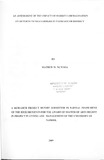| dc.description.abstract | The aim of this study was to investigate the impact of liberalization of the tea sector on tea returns to farmers. The overall goal of liberalization was to empower farmers and improve their returns. This research looked at these target goals of liberalization that include management, Policy, production, haulage, marketing and new market development.
Recent decades have seen rapid growth of the world economy. Markets and tea returns in most developing countries have not shared in the prosperity even after liberalization though it was anticipated to increase jobs opportunities and maximize on returns. The resultant situation being farmers’ dissatisfaction with tea farming. The study has borrowed from liberalization theories like Ohlin Trade Theory, International trade theory and free trade theory these theories were chosen due to their relevance to try and help in assessing the impact of tea sector liberalization.
The research design was a descriptive study. Data collection was carried out by administering questionnaires, through focus groups and interviews where appropriate. The collected data was analyzed and presented by use of both qualitative and quantitative methods using the Statistical Package for Social Sciences (SPSS)
The study main findings were that liberalization of tea marketing did not benefit the farmers as intended. Therefore the liberalization objectives were not met. Competition, management and cost of production were cited as major liberalization objectives that were not met hence impacting negatively on tea farmers returns. Key recommendation points include stakeholders’ empowerment through capacity building on management, segregation of policy issues by Tea Board as regulator so as to reduce duplication and conflict of roles by both management and elected leaders. Value addition and technological embracement in line with the global manufacturing trends geared towards improving and enhancing farmers’ returns from tea. | |

